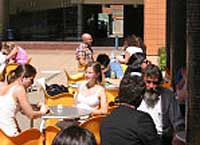|
||||||||||||||||||||||||||
| Food Science and Technology - FOODE13060 | ||||||||||||||||||||||||||
Program Description
This program is designed to provide depth and breadth in the relevant physical and biological sciences on which food science and technology is based. It is strongly recommended that students obtain, before the completion of the program and during recess periods, as much professionally oriented or industrial experience as possible. The BSc program in Food Science and Technology, and in Food Science and Nutrition (3060) is Pass or Honours, the level of which is determined by academic performance in Stages 1-4 according to a formula determined by the Faculty.
Program Structure- Food Science and Technology Plan
Year 1
* BABS1201 Molecules, Cells and Genes (6 UOC) * FOOD1120 Introduction to Food Science (6 UOC) * FOOD1130 The Food industry (6 UOC) * MATH1031 Mathematics for Life Sciences (6 UOC) * MATH1041 Stats for Life & Soc Sciences (6 UOC) * PHYS1111 Fundamentals of Physics (6 UOC) And ONE of: * CHEM1011 Fundamentals of Chem 1A (6 UOC) * CHEM1031 Higher Chemistry 1C (6 UOC) And ONE of: * CHEM1021 Fundamentals of Chem 1B (6 UOC) * CHEM1041 Higher Chemistry 1D (6 UOC) Year 2 * BIOC2181 Fundamentals of Biochemistry (6 UOC) * BIOC2291 Fundamentals of Molecular Biol (6 UOC) * CHEM2921 Food Chemistry 1 (6 UOC) * FOOD1230 Food Choice (6 UOC) * MICR2201 Fundmt of Microbiol & Immuno (6 UOC) * FOOD1360 Food Processing Principles (6 UOC) * General Education courses (totalling 12 units of credit) Year 3 * INDC2003 Industrial Chemistry Laboratory 1 * FOOD1370 Food Preservation: Principles (6 UOC) * FOOD1390 Product Design and Development (6 UOC) * FOOD2320 Food Microbiology (6 UOC) * FOOD2330 Quality Assurance and Control (6 UOC) * FOOD2340 Food Safety (6 UOC) * FOOD3220 Nutrition (6 UOC) * FOOD1380 Unit Operations in Food Processes (6 UOC) Year 4 Stream A * FOOD5400 Industry Liaison (6 UOC) * FOOD1490 Advanced Food Chemistry (6 UOC) And ONE of: * FOOD1400 Project (6 UOC) * FOOD1480 Minor Project (6 UOC) For students taking FOOD1400 project, you must complete this over 2 Semesters (12 UOC) and complete 24 UOC of electives. For students taking FOOD1480 project (6UOC), you must complete 30 UOC of electives. Stream B: Industry Module Program * FOOD5400 Industry Liaison (6 UOC) * FOOD5410 Industry Practicum (24 UOC) Plus Electives totalling 18 UOC During Stages 3 and 4 of the program, excursions are made to various food industries. Detailed reports of some of these visits may be required. Elective list:
* BIOT3011 Biotechnology A (6 UOC) * BIOT3021 Biotechnology B (6 UOC) * BIOT3071 Commercial Biotech (6 UOC) * ECON1101 Microeconomics 1 (6 UOC) * ECON1102 Macroeconomics 1 (6 UOC) * FOOD2350 Forensic Food Science (6 UOC) * FOOD2360 Food Toxicology (6 UOC) * FOOD2480 Advanced Food Microbiology (6 UOC) * FOOD2500 Food Diagnostics (6 UOC) * FOOD3440 Advanced Nutrition (6 UOC) * FOOD4450 Advanced Food Processing (6 UOC) * INFS1603 Business Data Management (6 UOC) * MARK1012 Marketing Fundamentals (6 UOC) * PHPH2101 Physiology 1A (6 UOC) * PHPH2201 Physiology 1B (6 UOC) Or such other electives as approved by the Head of School. Note that not all electives will run every year. General Education Requirements
Students in this program must satisfy the General Education requirements. For further information, please refer to "General Education" in the Table of Contents (see left-hand side of page). Academic Rules Please refer to Program Structure and contact the School of Chemical Sciences and Engineering for the Academic Requirements relating to this program. Internal transfer is permitted from this program to the 3970 Bachelor of Science program. Fees For information regarding fees for UNSW programs, please refer to the following website: https://my.unsw.edu.au/student/fees/FeesMainPage.html Professional Recognition Graduates of this program may qualify for membership of the Australian Institute of Food Science and Technology, the US Institute of Food Technologists, the Royal Australian Chemical Institute or the Nutrition Society of Australia, depending on specialisation. The program provides basic preparation for food science and technology careers in the food industry, the public sector, education, research, the food service industry, public health, management and marketing. Graduates may also find careers in health and environmental sciences, management of food resources and food wastes, and communication, and in areas such as dietetics after further training. |
||||||||||||||||||||||||||



